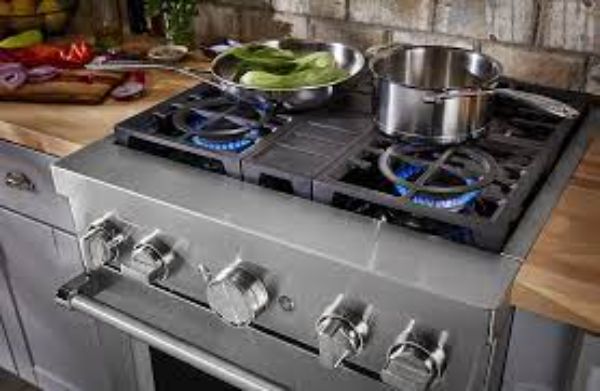When it comes to selecting a range for your kitchen, one of the primary decisions you’ll need to make is whether to go with a gas or electric model. Each option has its unique advantages and considerations, which can impact your cooking experience and overall satisfaction.
In this blog post, we will explore the important factors to consider when choosing between a gas and electric range, allowing you to make an informed decision based on your specific needs and preferences.
Table of Contents
Heat Source and Control
Gas ranges are powered by natural gas or propane, providing instant and precise heat control. The open flame allows for quick adjustments in temperature, providing a responsive cooking experience. Gas ranges offer excellent heat distribution and are preferred by many professional chefs for their ability to achieve precise cooking results.
Electric ranges utilize heating elements located beneath the cooktop. They provide consistent and even heat distribution, eliminating hot spots. Electric ranges often feature smooth, glass-ceramic cooktops, which are easy to clean and maintain. The heat on an electric range takes some time to adjust, as the elements need to heat up or cool down.
Installation and Fuel Availability
Installing a gas range requires access to a natural gas or propane line. If you already have a gas line in your kitchen, installation is relatively straightforward. However, if a gas line is not readily available, you may need to consult a professional to determine the feasibility and cost of installation. It’s important to note that gas ranges require proper ventilation for the safe release of combustion byproducts.
Electric ranges only require access to a standard electrical outlet. This makes them more versatile and easier to install, as most homes already have the necessary electrical infrastructure in place. However, it’s essential to ensure your electrical circuit can handle the power requirements of the range.
Energy Efficiency
Gas ranges are generally considered more energy-efficient when it comes to direct heat output. They provide instant heat and respond quickly to adjustments, allowing for precise cooking and minimizing energy waste. However, gas ranges may lose some energy efficiency due to pilot lights and gas leaks if not properly maintained.
Electric ranges can be more energy-efficient in terms of overall energy consumption, as they convert a higher percentage of the energy used into usable heat. However, the indirect heating process and slower response time may lead to slight energy inefficiencies when it comes to cooking speed and temperature control.
Safety Considerations
While gas ranges are generally safe to use, they come with a few safety considerations. It’s crucial to ensure proper ventilation to prevent the buildup of carbon monoxide. Gas leaks can be hazardous, so regular maintenance and inspections are necessary. Additionally, an open flame can pose a fire risk if not attended to carefully.
Electric ranges are considered safer in terms of potential gas leaks and open flames. However, the smooth cooktop surface can retain heat and may pose a burn risk if not handled with caution. Additionally, the electrical components should be regularly inspected to ensure safety.
Maintenance and Repair
Gas ranges require periodic maintenance, including cleaning burners and checking for gas leaks. Repairs may involve addressing issues with ignition, gas supply, or the oven’s heating element. It’s advisable to have a professional handle any repairs or maintenance tasks involving gas connections.
Electric ranges are generally easier to maintain, as they have fewer moving parts and no gas connections. Cleaning the smooth cooktop and ensuring the electrical connections are secure are essential. Repairs may involve fixing or replacing heating elements, controls, or electrical components.
Gas vs. Electric Range
| Gas Range | Electric Range | |
|---|---|---|
| Heat Source and Control | Open flame, instant and precise heat control | Heating elements, consistent and even heat distribution |
| Installation and Fuel | Gas line required, proper ventilation | Standard electrical outlet |
| Energy Efficiency | Efficient direct heat output | Overall energy efficiency |
| Safety Considerations | Gas leaks, open flame | Smooth cooktop surface, electrical components |
| Maintenance and Repair | Periodic maintenance, gas connections | Easier maintenance, heating elements, electrical components |
Conclusion
The choice between a gas and electric range ultimately depends on your cooking style, kitchen setup, and personal preferences. To summarize the key points:
- Gas ranges offer instant and precise heat control, preferred by many chefs for their responsiveness and ability to achieve precise cooking results.
- Electric ranges provide consistent and even heat distribution, with smooth cooktops that are easy to clean.
- Gas ranges require access to a gas line and proper ventilation, while electric ranges only need a standard electrical outlet.
- Gas ranges are considered more energy-efficient in terms of direct heat output, while electric ranges are more energy-efficient overall.
- Gas ranges come with safety considerations such as proper ventilation, gas leaks, and open flames. Electric ranges eliminate the risk of gas leaks and open flames but require caution with the hot cooktop surface.
- Maintenance and repair requirements differ between gas and electric ranges, with gas ranges needing periodic maintenance and potential repairs related to gas connections, and electric ranges being easier to maintain with repairs focused on heating elements and electrical components.
When making your decision, consider factors such as your cooking preferences, available fuel options, installation requirements, energy efficiency, safety considerations, and maintenance expectations. It can be helpful to consult with professionals or knowledgeable sales representatives to ensure you make the best choice for your specific needs and kitchen setup.
Remember, both gas and electric ranges have their benefits and considerations. Choosing the right range will enhance your cooking experience and ensure a well-equipped kitchen that meets your culinary needs.

